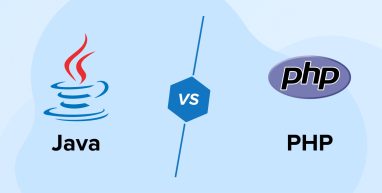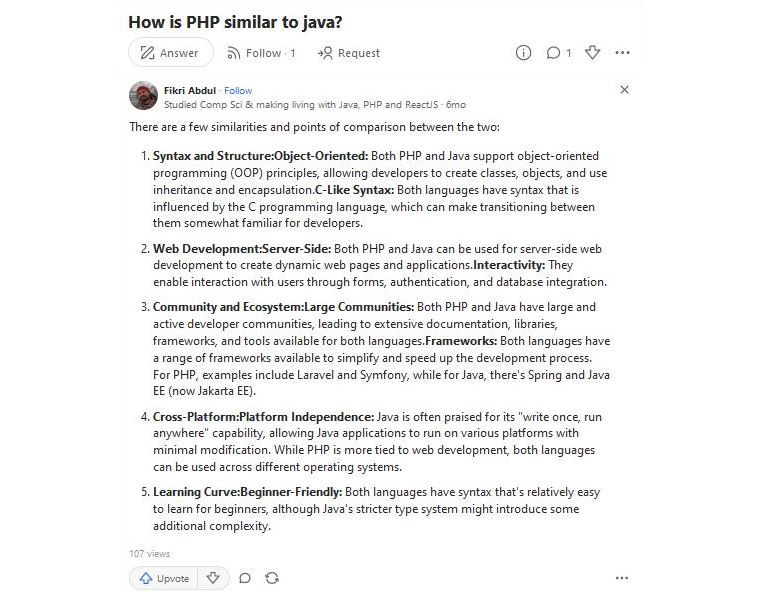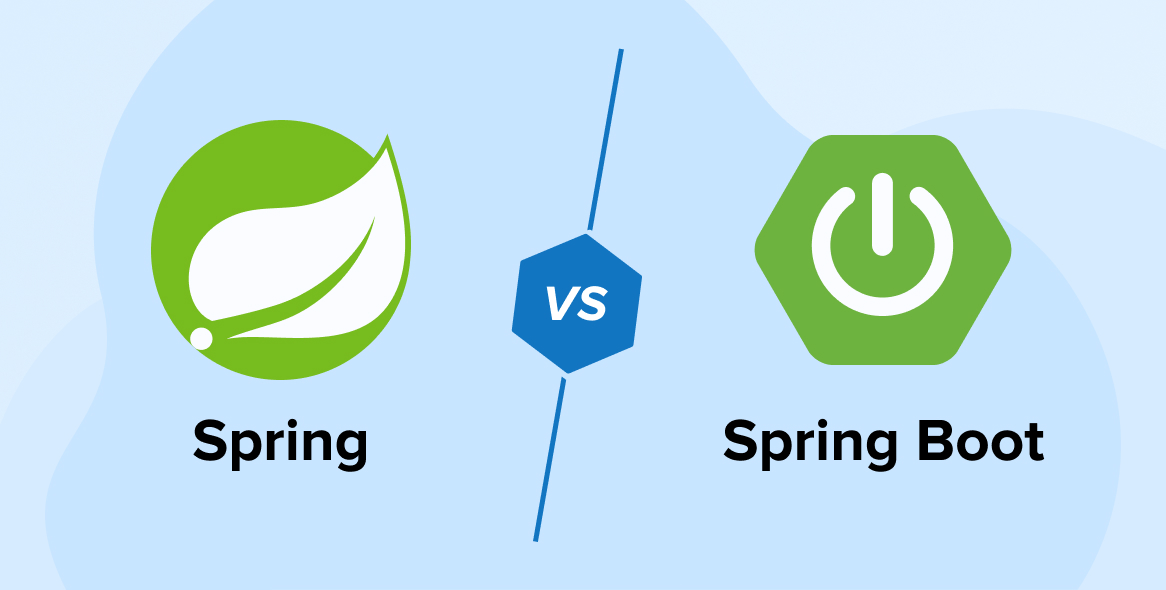
In this age of digitalization, developers are looking for different programming languages that can adapt well to the advancements and trends of the web development industry. Java and PHP are the leading programming languages in the field. Each comes with its range of features, functions, pros, and cons. You have to look at the project through business and technological contexts to pick the right side in Java vs PHP.
Utilizing PHP can help you quickly create web pages whereas leveraging Java development services allows you to build large and complex web applications. Choosing the right language won’t just help you create a quality and reliable product but also provide you with an opportunity to boost your business growth.
This article provides a comprehensive comparison in the Java vs PHP format to debate the usefulness of both languages for your upcoming web application development project.
1. Overview of Java
Java programming language is specifically designed to be compatible with different types of platforms. After all, apps nowadays are required to offer cross-platform compatibility features.
It is claimed that billions of devices are empowered through the Java platform, making it one of the most widely used programming languages. One reason behind it might be that Java is very simple even compared to C++ as it supports all kinds of object-oriented programming features.
Java’s purpose of providing and running on any device is fulfilled with the utilization of Virtual Machines. Being a compiled language, all Java apps are compiled into bytecodes and are run through Java Virtual Machine implementation. If there is any gap between the binary digits and source code, Java helps you bridge it.
Getting an Oracle Java License can help you enhance the data security on your computer. Moreover, it also helps you fix bugs after installation. Many useful features from programming languages like C++ and C are borrowed and implemented in Java.
The biggest benefit of this object-oriented language is that it can be used in all types of programming such as server programming, web programming, or application programming.
1.1 Features of Java
Java comes with a wide range of features. The best of it includes:
1. Object-Oriented
Every single element in Java is considered an object because it’s an object-oriented programming language. Java treats your software as a collection of various objects. It is easy for these objects to incorporate different types of data and behavior.
Object-oriented programming provides a set of rules that helps simplify the software development and maintenance process. Object, Inheritance, Abstraction, Class, Polymorphism, and Encapsulation are the OOP’s basic concepts.
2. Platform Independent
Java isn’t like C, C++, or other traditional languages that are platform-specific. It is based on a concept called write once, run anywhere. Java stands out from other programming languages because it can easily run on any device platform. It mainly consists of two components;
- Runtime Environment.
- Application Programming Interfaces.
In short, you can compile the Java code into bytecode using a compiler and then run it on multiple platforms like Linux, MacOS, Windows, Sun Solaris, etc. Because the bytecode is cross-platform, it can be easily executed on multiple platforms. Hence, write once, and run anywhere.
3. Security Features
Java is largely used for building virus-free systems. Some of the reasons why Java is considered secure are as mentioned below:
- Don’t have any explicit pointer.
- All Java classes are loaded in the Java Virtual Machine through JRE’s Classloader. It keeps the classes that are imported from network sources separate from the local file system’s classes and keeps them in different packages. This helps enhance the app’s security.
- The Bytecode Verifier in Java checks the fragments of code for illegal code that can violate the access rights to the objects.
- Java’s Security Manager can determine which class can access which resources like reading or writing a local disk.
All these security features are offered in Java by default. The app developer can further improve the security with effective implementation of Cryptography, JAAS, SSL, and so on.
4. Multi-Threaded
A thread acts as an individual program and they are executed concurrently. Java helps define multiple threads which can help deal with multiple tasks simultaneously. What’s more interesting about multi-threading is that you don’t need separate memory storage for each thread. They all share a common memory. If you are developing web apps or multimedia applications then multithreading can come in handy.
5. Extensive API Library
Java comes with an extensive API library that can help you develop complex web apps. With Java programs, building apps with a variety of functions and features becomes easy.
1.2 Pros of Java
Using Java can provide you with the following benefits:
1. Secured
Java allows you to embed security features in your web app in the early development stages. It helps keep your data and systems secure. The SDK and JRE from Java offer these security options which are effectively enhanced with every new version of Java. Security is the biggest benefit a technology can offer to large enterprises.
2. Multiplatform Programming Language
Java allows you to integrate with multiple platforms and fulfill the non-functional requirements of a web development project. Its two-step life cycle mechanism which consists of compilation and interpretation is the core feature of the language. It helps Java developers create versatile web applications.
3. Popularity among Developers
Java is very popular among developers. A large number of developers use Java for web development purposes. The language also boasts the support from one of the strongest and largest communities.
4. Community Support
If you stumble upon a problem during Java development then you can get support from the significantly strong community of this language. They provide immediate responses to your queries. There are different kinds of portals that you can use to access free tips, advice, and resources.
5. Interoperability
You can synchronize Java programming language with various databases and APIs. This allows for great interoperability as well as brings down the cost of integration with different systems and third-party libraries.
1.3 Cons of Java
Along with the benefits, there are also some disadvantages of using Java. It includes:
1. Development Costs
Not all Java versions are free to use. The versions used for building enterprise applications are very costly. On top of that, there are going to be some additional costs associated with Java such as hardware requirements for CPU and memory.
2. Verbosity of Code
The code of Java is more verbose. This means you must write more code lines to develop your web applications. More code lines mean more chances of errors and bugs.
3. Lack of Native Desktop Look and Feel
For creating a GUI, Java developers must use various language-specific tools. In terms of desktop UI/UX, Java is considered a weak language. You can get a GUI builder from the market but that will only increase your development time.
1.4 Companies Using Java
Companies that are empowering their platforms with Java development services include:
- Netflix
- Magento
- Microsoft
- Shopify
- Etsy
- Amazon
- Yahoo
- Airbnb
- WordPress
2. Overview of PHP
PHP was designed for server-side scripting and managing web servers. So, if you need to customize your web server and add some functionality then PHP is the best programming language for the task.
From building custom web pages to designing web servers, PHP is used very widely and is in high demand. PHP doesn’t even need a compiler, just an interpreter to interpret the PHP statements in a web page and provide the output in HTML.
This HTML is then sent to the user’s web browser which displays it to the user on its web page. Most of the WordPress-powered websites on the internet use PHP. Server-side scripting has become possible only because of PHP.
In addition to being used for coding a wide range of web applications, PHP can also be easily ported and deployed on any platform or operating system for free. The execution of PHP code is easy thanks to its command line interface. The language can be used with different types of web frameworks, web content management systems, and web template systems.
2.1 Features of PHP
Let’s take a brief look at the features this programming language offers.
1. Easy-to-Modify
PHP is a great option for beginners who want to learn to code quickly. It has a syntax that is very similar to C, Perl, and Java. And it has a shallow learning curve.
2. Embeddable
Embedding HTML codes is easy when using PHP. It helps in creating dynamic web pages. It is also easy for developers to add content to their web pages to make the website more communicative and attractive.
3. Scalable
If you are looking for a language that offers reliability and high-level performance then look no further than PHP. It can easily manage increased web traffic without affecting your site performance. PHP is an ideal option for large-scale app development.
4. Huge Community
A large community supports PHP with the development of various frameworks, and tools that contribute to the evolution of the language. Moreover, many websites work specifically to resolve the queries of the PHP developer and assist them in overcoming problems during development.
The PHP community works relentlessly to improve the language daily, making it more reliable and a future-proof choice for web app development.
5. Security
Although you can use third-party integrations for security, PHP already comes with various pre-defined functions for data encryption. It is believed that security and flexibility are opposing features but PHP handles both of them well.
PHP is a secure language used for coding CGI programs. The strings in PHP are encrypted using security algorithms like Sha1 and MD5. The user environment is kept safe and secure with the help of functions such as strip_tags and Filter_var.
2.2 Pros of PHP
When PHP is such a useful language, of course, there are going to be many benefits from its usage. Here we mention a few.
1. Low Development Expenses
In any project, cost will always be the primary concern. You don’t need to obtain a commercial development license to use PHP which reduces your costs. Additionally, PHP’s memory consumption is less and it brings down the general equipment requests.
2. HTML Compatibility
PHP, when integrated with HTML can help you write dynamic logic for your site’s front end. And because it is very flexible, PHP helps you build a variety of sites.
3. Extensive Community Support
It’s almost three decades since the initial release of PHP. So, the language has gained support from a huge community. It offers extensive documentation which benefits the programmers with PHP development. Such support makes PHP a stable and reliable language. This means that you can find necessary information and software tools whenever you need them.
2.3 Cons of PHP
In addition to its advantages, it is also important to know the limitations of this open-source language.
1. Ineffective Error Handling
Developers know very well that PHP is not suitable for handling errors. The language lacks the proper debugging tools needed to fix the bugs in its code. Java and other programming languages offer way more debugging tools than PHP.
2. Expanded Developers
Although PHP is very popular, the job market and talent pool for it are very scarce compared to other top programming languages. Businesses would also prefer a language consisting of a large developer base as it makes it easy for them to access talent for their development and maintenance projects.
3. Security
PHP is not as secure as Java. The primary reason behind it is that PHP is an open-source interpreted language. Its ASCII text file is easily available. Although PHP tries to fill its security gaps with every new release, you have to consider these gaps when planning your PHP development projects.
2.4 Companies Using PHP
Companies using PHP web services for software development and maintenance are:
- Baidu
- MailChimp
- Digg
- Slack
- Fotolia
- Tumblr
- Flipkart
- Wikipedia
- Canva
- Flickr
3. Java vs PHP: Similarities

There are many differences between both programming languages. But interestingly, in the debate for Java vs PHP, both contenders have some similarities as well. So, before we browse through their differences, it is important to know the similarities between PHP and Java.
- Object-oriented – Both languages support OOP paradigms including Polymorphism, inheritance, and encapsulation.
- Ease-To-Learn – Learning PHP and Java is very easy. Rather than using various programming languages, beginners prefer to learn to code with Java and PHP only.
- Open-source- Both Java and PHP are open-source programming languages and hence, free to use. It is also easy to modify and distribute them based on the needs of your project.
- Syntax – The syntax in both PHP and Java are similar. That is why both have the same data member definition, member functions, classes, looping structures, and more.
- Code reusability – Reusability is supported in both PHP and Java. This allows the developers to reuse their code in different app development projects. It helps them save time and money.
- Community-driven – The communities of both Java and PHP web development languages are very active and large. They work relentlessly to develop the languages and associated frameworks and tools.
4. Java vs. PHP: The Difference
After discussing their similarities, let’s check out the basic differences between PHP and Java.
- Java is hailed as a general-purpose programming language whereas PHP was designed specifically to be a server-side scripting language.
- Java is typed strongly and compiled. Meanwhile, PHP is dynamic but typed weakly.
- PHP allows you to customize and rebuild your site and Java comes with a set of robust APIs.
- You can find methods for overloading and overriding in Java but none in PHP. However, PHP allows you to set parameter choices for methods and functions.
- PHP is filed and has no concept of packaging whereas Java is used for various purposes of packaging and deployment.
- Java is used to quickly create complex applications whereas PHP is used to quickly create web pages.
- PHP is an interpreted language whereas Java is an object-oriented compiled language.
- In PHP OOP is provided as an option. In Java, OOP comes by default.
- In terms of security, Java triumphs over PHP.
- Java is a suitable option for large and complex projects whereas PHP is a suitable option for small and medium-sized projects.
5. Java vs PHP: In-Depth Comparison
In web development, it is crucial to pick the right programming language as it can affect the app’s security, performance, and scalability. In Java vs PHP, we saw their strengths and limitations. We also took a glance at their similarities and differences. But now, it’s time to take a deep dive and conduct a thorough analysis of PHP and Java.
5.1 Performance
Both Java and PHP utilize different approaches for executing code. Java provides quick execution as it pre-compiles the code into bytecode whereas PHP takes time in managing the bytecode.
Although both languages are optimized to improve performance, in terms of speed, Java is faster than PHP- Benchmarks Game conducted a PHP and Java comparison based on a few parameters. Java outperformed PHP in most of the parameters such as time, memory usage, and CPU usage.
This study shows that Java offers better performance and is very well capable of fulfilling your requirement of quick code execution and building complex, and high-performance applications.
5.2 Stability
Finding the right balance for the code length is critical for the stability of the software. The code must include the necessary logic, documentation, and error handling but it shouldn’t be too comprehensive otherwise it will lose its maintainability and readability which are crucial for stability.
Java renders a high level of stability as it has extensive yet well-crafted code. PHP, on the other hand, has a shorter code that couldn’t offer the same level of stability. That is the reason why many fintech companies prefer to use Java because it has a track record for fewer crashes than PHP.
5.3 Syntax
PHP and Java have very different Syntaxes. Java is typed statically so it needs a specific data type to declare the variables whereas PHP is typed dynamically, so it doesn’t need any specific data type to declare variables.
Similarly, PHP does not need to end every statement with a semicolon but Java does. These seemingly small differences also affect the ease of using the programming language.
Those semicolons can force Java developers to spend more time writing code ensuring everything is placed properly. And the need to declare specific variables can force them to put in more effort. PHP is more flexible in such cases than Java.
Let’s see a simple program to print to get more idea on Syntax.
Hello world program
JAVA
public class Main { public static void main(String[] args) { System.out.println("Hello World!"); } } |
PHP
<?php echo "Hello World!"; ?> |
Declaring Variables
JAVA
String myText = "Harry"; int myNumber = 45; boolean myBoolean = true; double myDecimalNumber = 5.99; |
PHP
<?php $myText = "Harry"; $myNumber = 45; $myBoolean = true; $myDecimalNumber = 5.99; ?> |
Declaring and Initializing Arrays
JAVA
String[] fruits = {"apple", "banana", "orange", "grape", "kiwi"}; |
PHP
<?php $fruits = array("apple", "banana", "orange", "grape", "kiwi"); ?> |
Object Creation
JAVA
public class Student { String firstName; String lastName; int age; public Student(String firstName, String lastName, int age) { this.firstName = firstName; this.lastName = lastName; this.age = age; } public static void main(String[] args) { Student student = new Student("Harry", "Smith", 16); System.out.println("Details of student:"); System.out.println("Name: " + student.firstName + " " + student.lastName); System.out.println("Age: " + student.age); } } |
PHP
<?php class Student { public $firstName; public $lastName; public $age; public function __construct($firstName, $lastName, $age) { $this->firstName = $firstName; $this->lastName = $lastName; $this->age = $age; } } $student = new Student("Harry", "Smith", 16); echo "Details of student:" . PHP_EOL; echo "Name: " . $student->firstName . " " . $student->lastName . PHP_EOL; echo "Age: " . $student->age . PHP_EOL; ?> |
5.4 Popularity
Currently, there is more demand for Java than PHP. The hiring requests for Java developers are topping the charts while requests for PHP developers are in 7th place. As per an estimate, approximately, 19.1% of developers are eager to learn Java, and only 6.2% wish to learn PHP.
As a choice for web development, 44% of developers prefer to keep using Java whereas 37.3% of developers prefer to continue using PHP. So, in terms of popularity, Java outperforms PHP.
5.5 Talent Pool
As per an estimate, around 38.4% of developers use Java and only 25.8% of developers use PHP. So, Java boasts a bigger talent pool than PHP.
5.6 Security
The priority of every business in a web development project is always going to be security. Java has more security options to offer than PHP. The latest Java version is said to be the most secure version ever as it ensures that your enterprise-level applications are deployed with high-end security.
Being an open-source programming language puts PHp at a serious disadvantage as its ASCII code is public. Moreover, PHP doesn’t come with any security features. So, the entire responsibility falls upon developers to take necessary measures to protect their web applications.
In short, using Java can offer better web app security compared to PHP.
5.7 Cost of Development
The development cost is one of the factors considered when choosing a suitable programming language for the project. It largely depends on the type of tasks you currently have on hand, considering whether it is long, medium, or short-term.
Sometimes it is not required to undertake long-term tasks as you can leverage microservices for effective task distribution. Therefore, for businesses that prioritize cost-effective app development, PHP has the upper hand.
Because Java development demands a significant investment of time and resources. Meanwhile, PHP is a budget-friendly option. Hiring PHP developers is also easy and cost-efficient as the language is used worldwide. Moreover, the salaries of experienced PHP developers are low compared to their Java counterparts.
5.8 Learning Curve
The learning curve can greatly impact the cost and availability of developers.
In the PHP and Java comparison for learning curve, PHP comes with a user-friendly syntax that resembles the English language and has fewer symbols. So, it becomes easy for developers to understand and write the code.
Although the learning curve of Java is steeper, developers proficient in C++ and C languages can easily get started with it. The familiarity of product owners in SCRUM and ORACLE also allows them to get a hand on Java development without investing much time learning the language.
5.9 Developer Tools
Both programming languages offer a large range of performance monitoring, security, testing, and debugging tools, documentation, and IDEs. These tools are created by companies and individuals who cater to specific niches.
Popular PHP developer tools include IDEs like Eclipse, Zend Studio, and PHPStorm. PHP debugging tools include Xdebug, Selenium, and PHPUnit. Securimage and RIPS are PHP security tools. PHP performance monitoring tools include AppOptics, APM, and New Relic.
Popular developer tools include Java IDEs like BlueJ, Eclipse, JDeveloper, NetBeans, and IntelliJ IDEA. Java testing frameworks include TestNG, Selenium, Serenity, JBehave, and JUnit. Mumbled and SonarCUbe are Java quality control products. Java performance monitoring tools include NetBeans Profiler, Java VisualVM, and Oracle Java Mission Control.
5.10 Type System
When designing with Java, you have variables with a fixed type set because it is a statically typed language. Its static typing allows you to detect errors in the early development stages. Meanwhile, PHP doesn’t need a fixed type set for its variables. You are allowed to use functions, objects, arrays, numbers, and strings without being required to declare their type beforehand.
6. PHP vs Java Comparison Table
Here, we briefly compare PHP and Java web development languages against a few parameters.
| Parameters | Java | PHP |
|---|---|---|
| Performance | Faster because of JIT compilation | Slower because of its interpreted nature |
| Stability | Becomes stable after project deployment | Is stable at every stage of the project |
| Language Type | Compiled | Interpreted |
| Syntax | Less concise | More concise |
| Popularity | More Popular | Less popular compared to Java |
| Talent Pool | Larger talent pool | Smaller talent pool |
| Security | More secure | Less secure |
| Cost of Development | Expensive | Cost-effective |
| Memory Management | Automatic garbage collection | Manual memory management |
| Code Compilation | JVM executes the compiled code | PHP interpreter executes an interpreted code |
| Exception handling | Need to catch or declare checked exceptions | Can catch exceptions but not necessary. |
| Concurrency | Supports multithreading and parallel processing | Supports multithreading but not parallel processing |
| Type system | Strongly typed | Weakly typed |
| Standard libraries | Rich and extensive libraries | Basic and limited libraries |
| Database connectivity | Uses JDBC to connect with the databases | Uses extensions like PDO and MySQLi. |
| Popular frameworks | Apache Maven, Hibernate, Spring, and Struts | Symfony, Composer, Laravel, and CodeIgniter. |
| Learning curve | Steep learning curve | Easy to learn |
| Developer Tools | BlueJ, JDeveloper, IntelliJ IDEA | Zend, PHPStorm, Zend |
7. When PHP and Java are Used?
You can utilize Java programming language to build:
- Enterprise apps
- Android apps
- Gaming apps
- Desktop apps
- Mobile apps
- Web applications
PHP programming language is useful for developing:
- Online marketplaces
- Content management systems
- APIs
- eCommerce sites
- Online Forums
- Social Media platforms
8. Conclusion
This comprehensive comparison between PHP and Java ought to provide a better understanding of both programming languages. It makes one thing clear, both PHP and Java have different functions and purposes.
Java is preferred by web developers for frontend development whereas they prefer PHP which is a server-side scripting language for backend development. Using any language would have its pros and cons. The only thing that matters is whether using a particular language can help you fulfill your business requirements.
Along with the market trends, developers as well as product owners must have clearly defined needs for their project such as development costs, security, ease of use, performance, documentation, coding speed, and so on. This enables you to make an informed decision in the case of PHP versus Java.
FAQs
Is Java Faster than PHP?
Although both programming languages are optimized for performance, PHP needs a little time to execute bytecode whereas Java pre-compiles its code into bytecode which leads to a quick execution.
Is PHP Best for Web Development?
PHP is your go-to option for web development if you are building services with medium complexities, or content-driven websites and communities. PHP is an ideal option for startups. If you want to build something quickly and within budget, then PHP is the way to go.
Is Java Better for Web Development?
If you have to build complex systems with advanced features like real-time calculations, multiple integrations, data streaming, and non-trivial data storage mechanisms then Java is the right fit. Java excels at enterprise development.






Comments
Leave a message...